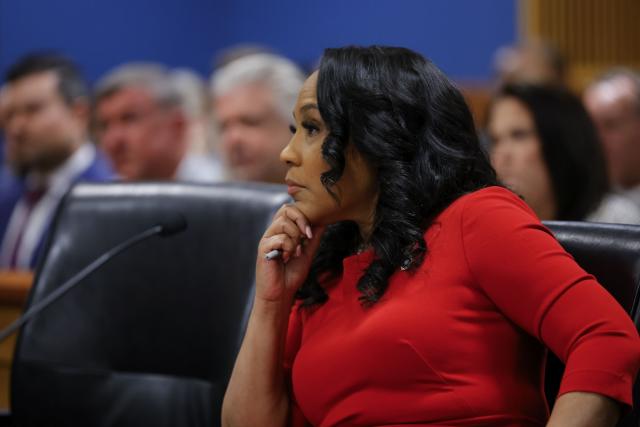Jurors In Trump’s Trial May Have Left-Leaning Bias, Reports Suggest
In an unprecedented legal proceeding, potential jurors for former President Donald Trump's criminal trial appear to skew to the left, politically speaking, raising concerns about the fairness of the trial.
Reporter Maggie Haberman has observed a political slant among those selected for the jury pool in Manhattan, where Trump is facing 34 felony charges, as Breitbart reports.
A seasoned New York Times journalist and CNN analyst, Haberman has spotlighted the political leanings of individuals being considered for the jury in Donald Trump's landmark trial.
This observation comes amid the first criminal trial of a former United States president, with Trump confronting a series of serious charges. The genesis of these charges lies in accusations of document falsification intended to hide details of a sex scandal, leading to Manhattan District Attorney Alvin Bragg indicting Trump on 34 felony charges.
The political environment of Manhattan, where the trial is taking place, further complicates the jury selection process. In the 2020 presidential election, President Joe Biden won over 86% of the vote in Manhattan, indicating a strong left-leaning voter base. This statistic is important as it sets the context for understanding the political demographics from which the jury pool is drawn.
Jury Selection Under Intense Scrutiny
Haberman's commentary on the political tendencies of potential jurors sheds light on the intricate process of jury selection in high-profile cases. She noted that many prospective jurors exhibit left-of-center political views, yet some have demonstrated an openness to consider differing perspectives. This nuance is critical in a case that garners national interest and where the impartiality of jurors is paramount.
The concern over potential "stealth jurors" -- individuals who may secretly harbor biases that could affect the trial's outcome - has been echoed by constitutional scholar Jonathan Turley during an appearance on Fox News. Turley emphasized the low support for Trump within the Manhattan area, suggesting that hidden biases could pose a significant challenge in ensuring a fair trial. He also highlighted past instances of juror misrepresentation in cases related to Trump associates, underscoring the importance of a thorough vetting process.
To mitigate the risk of bias, jurors in the trial are subjected to a comprehensive 42-question vetting process designed to scrutinize their perspectives and potential prejudices. This process, however, has stirred debate, with some critics arguing that the questions asked may inadvertently favor the prosecution, showcasing the contentious nature of jury selection in such a high-profile case.
Juror Challenges and Courtroom Developments
The trial has also witnessed challenges in selecting impartial jurors. New York Supreme Court Justice Juan Merchan has taken measures to address this issue by excusing two jurors – one due to concerns about her public identity possibly influencing the trial, and another for reasons not made public. These steps reflect the court's commitment to maintaining the integrity of the jury selection process.
Despite these challenges, progress has been made in assembling the jury, with 12 jurors and one alternate successfully seated. The court aims to select a total of 18 jurors, including alternates, indicating that the selection process is nearing completion. Currently, the trial is in its third day of jury selection, with expectations to conclude early the following week.
Public opinion on the trial remains divided, with approximately one-third of U.S. adults believing that Trump engaged in illegal activities related to the case, as per an AP-NORC poll. This statistic highlights the polarized views on the trial and underscores the importance of selecting a fair and impartial jury.
Reflections on Jury Service and Political Bias
In her observations, Haberman highlighted the complex dynamics at play in the jury selection process. She pointed out that despite a general leftward political inclination among potential jurors, there exists a subset of individuals committed to the principles of jury service, willing to set aside personal beliefs for the sake of impartial justice. This commitment to principle is essential in a trial as closely watched and politically charged as this one.
Jonathan Turley’s insight into the challenges of identifying "Trojan horse jurors" raises important questions about the efficacy of current juror screening methods. The experiences from previous trials involving Trump associates provide a cautionary tale about the potential for biased jurors to slip through the vetting process, suggesting that extra vigilance is necessary.
The rigorous 42-question screening process for jurors, while a measure designed to ensure fairness, has sparked debate over its efficacy and potential biases. This aspect of the trial illustrates the difficulties in striking a balance between thorough vetting and ensuring an unbiased jury pool, highlighting the complexities inherent in such high-stakes legal battles.
Conclusion: Navigating the Jury Selection Maze
In conclusion, the jury selection process for Donald Trump's criminal trial in Manhattan has unmasked the nuanced and often contentious endeavor of ensuring a fair and impartial jury.
Observations from Maggie Haberman and concerns expressed by Jonathan Turley spotlight the intricate balance that must be achieved in a case with profound political and social implications.
With a political landscape that heavily leans left in Manhattan and the history of juror misrepresentation in related cases, the trial's fairness hinges on the meticulous selection of jurors. As the process advances and the final jurors are seated, the nation watches closely, understanding that the outcome of this trial could mark a significant moment in American legal and political history.






